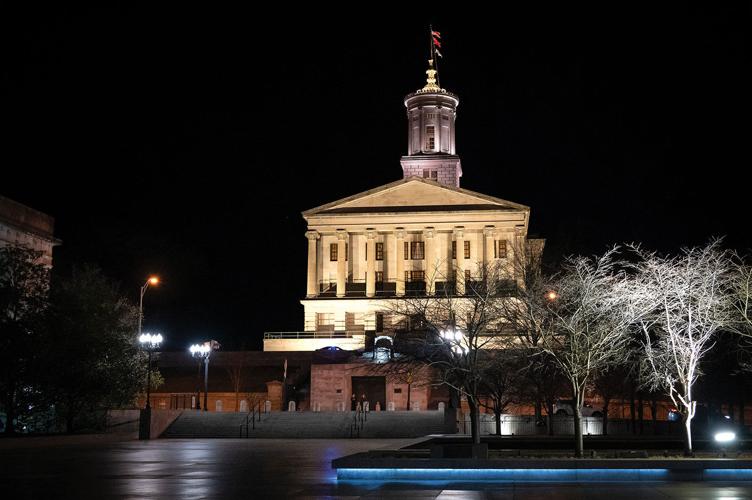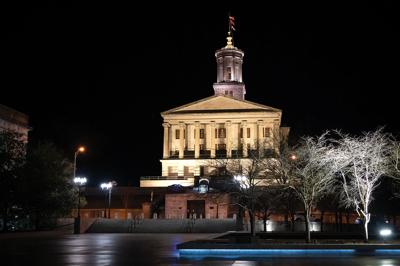The Tennessee General Assembly adjourned late on April 21 following a long and harrowing week of rapid-fire legislation, Republican infighting and scandal.
Following the Covenant School shooting on March 27, the General Assembly began a sprint to the finish line, with the Republican supermajority refusing to hear any form of gun control legislation despite pressure from not only protesters — who filled the gallery of the House chamber for nearly every floor session for weeks — but from Gov. Bill Lee himself. What’s more, just after the session’s conclusion, the governor called for a special session.
The final week was a long one, with floor sessions that lasted anywhere from three to eight hours. More than 100 bills were heard over the course of the week, and drama outside the chamber didn’t stop either.
Here are some highlights from the final week of 2023’s regular legislative session.

Former Rep. Scotty Campbell
Scandal
The House Republican Caucus almost made it through the session without any sexual harassment scandals. But on Thursday, NewsChannel 5 reported that Rep. Scotty Campbell (R-Mountain City) was found by a House ethics subcommittee to have violated workplace policies against sexual harassment. For weeks, Campbell, who was the vice chair of the House Republican Caucus, allegedly repeatedly sexually harassed at least one 19-year-old legislative intern. The committee report was delivered to House Speaker Cameron Sexton weeks before the news broke.
Five hours after NewsChannel 5’s story ran, Campbell resigned.
Guns
Gov. Lee on April 19 released a statement calling for the Tennessee General Assembly to pass extreme risk protection legislation — which aims to remove guns from people who are deemed a threat to themselves or others — before session’s end. While Lt. Gov. Randy McNally — himself plagued by scandal this session — voiced support for the proposed legislation, which was never given a bill number or a sponsor, Republican members of the House quickly came out in opposition. Ultimately, no extreme risk legislation was heard.
On April 20, Sen. Jeff Yarbro (D-Nashville) proposed similar legislation in the Senate, recalling Senate Bill 1029 from the Senate Judiciary Committee, where Chairman Todd Gardenhire (R-Chattanooga) deferred all gun-related legislation to 2024. The move failed.
One gun-related piece of legislation did find success. House Bill 1189 passed in the Senate on April 18 after passing in the House in March. Sponsored by Sen. Joey Hensley (R-Hohenwald), the legislation protects gun manufacturers, dealers and sellers from lawsuits in relation to illegal activity carried out with the products they sell. This happened as teachers in the gallery held signs calling for legislation to protect them from guns.
Following the adjournment of the session, Lee said he would call a special session soon in order to address gun legislation.
The Numbers Game
The state’s $56.2 billion budget passed through the House on April 19 and the Senate on April 20, concluding the only action the legislature is constitutionally required to complete while in session — everything else is just extra credit. This year’s budget includes funding for the governor’s Transportation Modernization Act, the $140 million Lee promised in order to put a school resource officer in every public school, $50 million for building a new state prison, more than $400 million in business tax cuts and a whole lot more. It also includes $2 million for an audit of Tennessee State University, the state’s only public HBCU. Democrats have called this a waste of money considering the denial of funding for Rep. Antonio Parkinson’s (D-Memphis) legislation to require rape test kits to be tested within 30 days.
The legislature also passed a pair of tax-related bills. The first, House Bill 323, permanently overhauls tax breaks for corporations. Also attached to the bill is a one-time, three-month grocery tax holiday, which is set to kick in late this summer and is estimated to save an average of $100 per family. Another bill, Senate Bill 626, provides tax breaks for corporations like FedEx by capping the amount any one entity has to pay in jet fuel taxes at $1 million. Jet fuel taxes are used to fund airports, and with the loss of that revenue stream, the funding will instead come from the general fund, moving the burden from corporations to individuals.
Culture War
Tennessee led the nation in anti-LGBTQ legislation this year, with 26 bills targeting the LGBTQ community. So it was no surprise that the Republican supermajority squeaked out three more pieces of legislation this week targeting LGBTQ communties, even as they were in a rush to get home.
Senate Bill 1237 requires athletes in private K-12 schools to participate in sports based on the biological sex assigned to them at birth. House Bill 239 adds “sex” as a defined term for statutory construction purposes — anti-trans politician language for not allowing a person who is transgender to change their gender on driver’s licenses and other documents. Senate Bill 466 allows anti-trans teachers to misgender students with no fear of any sort of repercussion. All three bills are on their way to the governor’s desk.
Schools
Finally, a small lineup of school-related bills passed through the legislature. One of the more significant pieces of legislation was Senate Bill 12, which expands Gov. Lee’s controversial private school voucher program. The program barely passed the House in 2019, and the legislature didn’t seem much more enthusiastic about this measure, which expands the program from Davidson and Shelby counties to include Hamilton County. The House tried to add an amendment to include Knox County, but upon negotiating with the Senate removed that stipulation.
Also on their way to the governor’s desk: Senate Bill 281,which increases teacher pay but prohibits union dues from being directly deducted from a teachers payroll; Senate Bill 1441,which requires parents to opt in for their students to be involved in certain conversations at school, such as discussions surrounding sexual orientation; and Senate Bill 102, which pairs nicely with the aforementioned SB466 by prohibiting schools from requiring teachers to go through implicit bias training.







